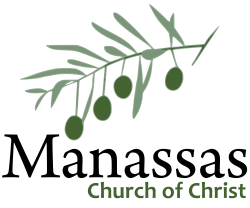 Now you are a member of the Lord's Church.
Now you are a member of the Lord's Church.
What do you do, and where do you do it, NOW? The primary purpose of this study is to build strong Christians who are faithful to the Lord, ACTIVE and ZEALOUS in His service. God wants no one to fall away.
This study will help you to remain steadfast and build you up in the faith.
This Series is written by Travis Mann and used here with attribution. More material from him is available at the website "That Christian Website"
Introduction:
- The purpose of the lesson before us is to learn something of the origin and nature of the church as it is revealed in the New Testament.
- We hear the term "church" used in a variety of senses today. Some use it to refer to a building, some to a man-made organization and some to a "religious social club"
- We want to restrict ourselves to the use of the word as found in the New Testament.
A. The New Testament church is a body of people who belong to the Lord.
- The meaning of the word "church" comes from the Greek word "ecclesia". The literal meaning is "to call out". This is the word used by NT writers. The word as used by Jesus and the apostles describes a "called out body of people".
- It is the body to which the saved are added. (Acts 2:47)
- Christ is the Head of this body. The terms "body" and "church" are used interchangeably. (Eph 1:22-23; Col 1:18)
- We must conclude: The church is not a building, but a body of people who are called out of the world by Christ.
B. The word "church" has two usages in the New Testament.
- Refers to the called out in a "local" sense. (1 Cor 1:2; Gal 1:1-2). Romans 16:16 and 2 Corinthians 8:23-24 speaks of local congregations.
- The second use is those who are the called out in a "universal" sense. All members of the church the world over. (Mt 16:18; Eph 5:23-25)
C. Being "called out" is a divine calling by Jesus. (1 Pet 5:10)
- Called into the fellowship and peace of the one body. (1 Cor 1:9; Col 3:15)
- As a result of our calling, we have a new relationship. We now belong to God. The price paid? We are bought and paid for by Jesus, thus, I belong to Him! (Rom 9:25; 1 Jn 3:1; 1 Cor 6:19-20;
- Acts 20:28; 1 Pet 1:18-19)
D. Ownership of the body is in Christ. This is why the church is called the "body of Christ". (1 Cor 12:27)
- Jesus said He would "build My church". What is so significant about this is that "My" denotes ownership. The church didn't originate with man, but through the precious blood of Jesus. Thus, the church belongs only to Jesus, not to any man! (Mt 16:18)
E. It is the body of the saved. There is ONE body and ONE Savior! Entrance into that body is by BAPTISM! (Eph 5:23; 4:4-5; 1 Cor 12:13)
F. The Bible uses another term to describe God's people: The kingdom (Col 1:13)
- The church and kingdom are used interchangeably. (Mt 16:18-19)
- The kingdom was foretold in OT prophecy. (Dan 2:44; Mk 9:1) a. Christ is the king to the kingdom, just as He is the Head to the church. (Jn 18:36)
- Just as the King and the Head is the same Person, the kingdom and the church are the same body of people.
- If the kingdom and the church are the same, we must conclude the rules of admission are the same. Water and Spirit parallels. (Jn 3:3-5; 1 Cor 12:13; Mt 7:21)
G. The New Testament uses another term to describe Christ's body:
- The Household of God. (Eph 2:19; 1 Tim 3:15). God is the Father, Christ is the Son over the house (Heb3:6). Those called in God's house are sons and heirs. (Gal 4:4-7; Rom 8:15-17). There are only two kinds of children; we are one or the other. (1 Jn 3:10)
- The terms of admission? Obviously, they are the same as for the kingdom and church.
- Admission is by birth into God's family. A seed must be planted. The seed produces faith in Jesus Christ, which leads to the new birth. (Lk 8:11; 1 Pet 1:23; Gal 3:26-27)
- When we are in Christ, then we are children of God.
- All of God's children are in His family. God has only one family. Question: If the church is God's family, how many churches does He have? How many of God's children are in the church?
Conclusion:
- "There are other terms found in the New Testament that are descriptive of the church. Eph 2:19-22; Mt 20:1-16
- We must remember, respect for Christ DEMANDS that we respect that body He purchased with His own blood.
Introduction:
- Now that I am a Christian, my life and my future are more important than ever before. I need to give special consideration to what I am going to do with the rest of my life.
- Jesus taught that a man must plan his life and consider the consequences before he acts. Just like the builder, I must give serious thought to what I am doing before I begin. I want to be a successful, fruitful unfaithful servant of God. (Lk 14:27-33)
- To achieve these goals, I must give consideration to the following areas:
A. I must resolve right now to be a Christian for Life.
- I can't please God any other way. Jesus taught I must keep the word with patient faithfulness. (Lk 8:11-15)
- Scriptures that will help me to recognize that fact: Rev 2:10; 2 Tim 4:6-8; Heb 10:35-39; 1 Pet 1:3-6
- These Scriptures emphasize the great blessings which are to come to the faithful. All of these great blessings are mine at the end IF I remain faithful unto Him!! All the more reason to determine to be a faithful Christian for life!
B. Family Considerations:
- What kind of a person will I marry? (to the unmarried). What are the benefits of marrying a Christian? Should I marry an unbeliever? The person I marry will have more bearing on my personal happiness than anyone or anything else in the rest of my life.
- What about the rearing of the children? I must plan to rear them properly. I must consider their spiritual welfare in all the decisions I make. (Prov 22:6; Eph 6:4)
- What about moving (due to job, personal considerations, etc)? Should I move my family into an area where there is no congregation of the Lord's people? What could be the consequences of moving where there is no church? Consider the difficulties that will be encountered.
- When I go on my vacation, will I plan it where I can be with the saints on the Lord's day? Can I take a vacation from the Lord? What should I do?
C. What kind of decisions will I make in regard to developing my talents and my personal growth in service to God?
- A Christian never arrives at a point where there is no more room for growth and challenge. A Christian's life is a life of continual striving for higher goals. (Phil 3:13-14)
- I need to set goals for my personal growth. I need to grow both in knowledge and spiritual strength. Where do I plan to be on the “Spiritual Maturity Ladder" in one year, five years? I need to resolve myself to study each and every day! (2 Pet 3:18)
- I should set goals for developing my talents. If I really want to be of service to God, I must begin NOW to equip myself with the qualifications necessary to succeed.
- Area of service: Elder, deacon, preacher, teacher, personal worker, elder's wife, deacon's wife, helper to the sick, song leader, etc.
- It is good to decide at an early age (in the faith) what you would like to accomplish. One reason for the lack of elders, deacons, preachers, etc is because young men never made the decision while they were young to work towards qualifying themselves in this endeavor.
- There are many 50 year old men in the church who were converted 30 years ago, but are not qualified to be elders because they were not thinking and planning ahead. They did not set goals for growth and service.
Conclusion:
**Each and every one of us should consider our future as a Christian. We should honestly evaluate ourselves as to what talents and abilities I have and how I can develop them to the fullest extent for the service of God.
**Remember, God doesn't expect more from us than we're capable of delivering!! But, He does require -we put our talents to work as good servants! (Luke 17:10)
Introduction:
- The purpose of this course is to help Christians get off to a good start!!
- This study is not only designed for new Christians, but also for those who have been recently restored in Jesus.
- It is designed to fulfill the responsibility of Mt 28:20.
- Its primary purpose is to build strong Christians who are faithful to the Lord, ACTIVE and ZEALOUS in His service. God wants no one to fall away. This study will help you to remain steadfast and build you up in the faith.
- It is essential that you commit yourself in the very beginning to complete this course and to be prepared at each class session.
- The lesson before us, “After Conversion”, presents some things you need to remember, and some things God wants you to do. This lesson will help prepare you for the rest of the study.
A. When I became a Christian God saved me from past sins.
- You were cleansed when you obeyed the Gospel. (Rom 10:17; Heb 11:6; Acts 2:38, 17:30; Mt 10:32; Mk 16:16)
- We enjoy the remission of sins that are past. (Rom 3:25)
B. God wants us all to be saved eternally. (2 Tim 2:10; 1 Tim 4:16; Rev 2:10)
- To be saved eternally, there are some things to remember:
- You are a new creature. (2 Cor 5:17; Rom 6:4)
- Because of this you should have respect for yourself, treating your body and mind with proper caution and care. (1 Cor 6:19-20)
- You are a babe in Christ. Your thoughts and actions will sometimes reflect this. (1 Pet 2:2; 1 Cor 3:1-2
- You are in a critical period. The devil desires to see you fall. Don't over estimate your spiritual strength. (Mt4:l-ll; 1 Cor 10:11-13)
- Recognize the possibility of falling. You have help to keep you from falling. (Acts 8:17-24; Jn 8:31; I Jn2:l-2
- You are a representative. Your family, friends and the world all know you are a Christian. They will be watching you. Observing if you are what you profess to be, a Christian!! (2 Cor 3:2; 1 Tim 4:12)
- Jesus is your example. God does not leave you adrift without direction for living a godly life. Jesus is who we follow, not men. Remember, men are only servants. (Heb 12:1-2; 1 Pet 2:21; 1 Cor 3:1-7)
C. To be saved eternally, there are some things God want me to do:
- Love Him FIRST!! God wants you to continue in the same love you first showed in obedience to Him through the Glorious Gospel!! (Mt 22:37, 10:37, 1 Jn 2:5)
- Study His Word. The same study that led to learning the truth, will also lead to spiritual maturity. (2 Tim 2:15; Acts 17:11; 1 Pet 3:15)
- Pray to Him for help. God does not leave you on your own. Put you total dependence upon Him, for He cares for YOU!! (Heb 4:16, Phil 4:6-7; 1 Thes 5:17; 1 Pet 5:7)
- Worship Him faithfully. Attendance is never a problem to one who desires to worship and serve the Lord. (Jn 4:24; Acts 2:42; Heb 10:24-31)
- Give to Him. First, make sure you have given yourself. Show love and devotion to God's Cause. (2 Cor 8:5; 1 Cor 16:1-2; 2 Cor 9:6-7)
- Help save others. Others need the same blessings you have (Jn 15:1-8; 1 Tim 2:3-4; Mk 16:15-16; 2 Tim 2:2)
Conclusion:
- What happens to you after conversion is just as important as what happened before conversion.
- Apply each of these principles DAILY!
- Enlist the help of other Christians with special problems you may have.
- God wants you to succeed! He wants you to grow into a mature, faithful Christian!
- Read 2 Pet 1:5-11. Set these as your goals from the beginning; resolve to finish the race as a faithful Christian!!




